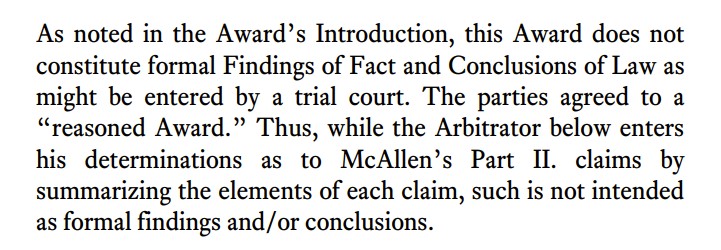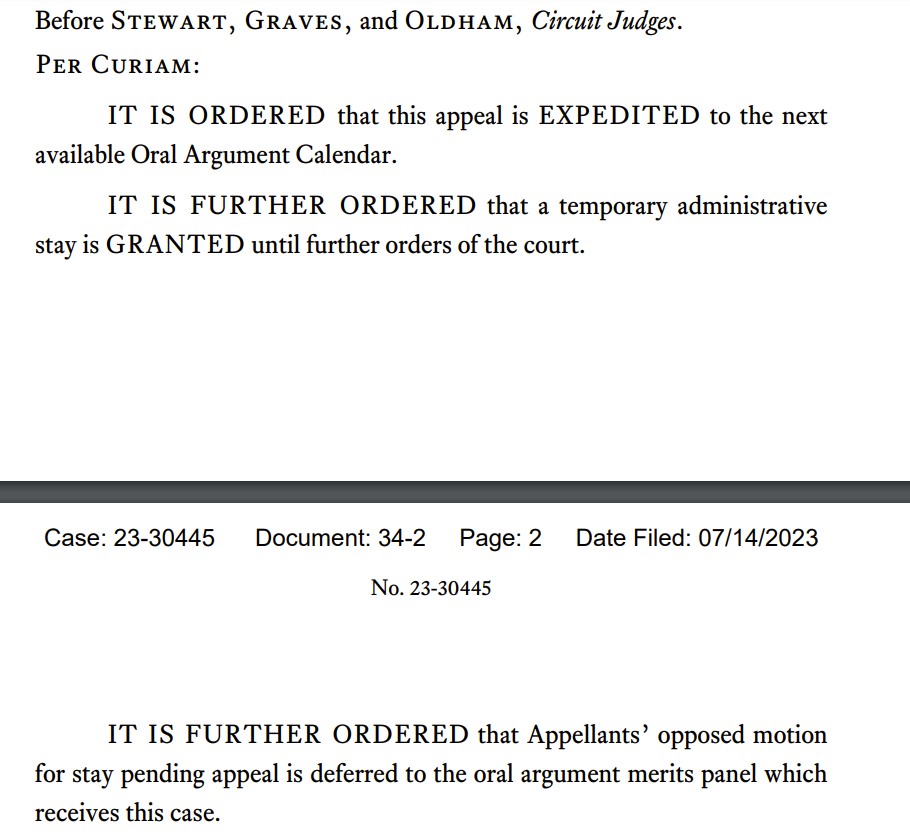I’m on a summer vacation road trip, blog posts will resume upon my return next week! I hope you are having an enjoyable summer with quality air conditioning. I also recommend that you see “Oppenheimer” — with or without seeing “Barbie” — as it offers some powerful insights about civil procedure run amok in Oppenheimer’s security-clearance hearings.
Monthly Archives: July 2023
After a well-publicized debacle in New York involving “research” in which ChatGPT invented nonexistent cases, the phenomenon of “hallucinatory” generative AI has arrived in Texas. The Waco Court of Appeals recently faulted a lawyer for providing a brief with three nonexistent cases (and, like the New York counsel, not responding when the problem was pointed out by the appellee). While there is nothing wrong with using ChatGPT to help with legal analysis and writing, uncritical acceptance of purported caselaw found “on the Internet” is always risky.
The Fifth Circuit found that fact issues about the plaintiff’s discovery of his potential claims precluded summary judgment in Bruno v. Biomet, Inc.:
On the one hand, a jury could reasonably determine that contra non valentem tolled the prescription period until September 2019—given Bruno’s consultations with his doctor, a medical professional. But on the other hand, a jury could just as reasonably determine that contra non valentem tolled prescription until some point in time before September 2019. It is unclear whether Bruno stopped suffering complications from infections after the removal, such that his recovery after the device’s removal would have put him on notice of any fault of Biomet’s before the letter was received.
No. 22-30405 (July 21, 2023).
Hogan v. Southern Methodist University presented, inter alia, the question whether Texas’s Pandemic Liability Protection Act – enacted in 2021 – bars a student’s complaint about SMU moving to an all-virtual learning environment in 2020.
The student argued that this backward-looking application of the law violated the Texas Constitution’s prohibition of “retroactive” laws — a unique feature of that instrument that, like the “open courts” provision, has no counterpart in the U.S. Constitution. SMU, supported by the Texas AG, argued otherwise.
The Fifth Circuit certified this issue to the Texas Supreme Court, noting its importance and the dearth of caselaw on the point to date. No. 20-10433 (July 20, 2023).
The plaintiffs in Clarke v. Commodity Futures Trading Commission sought a preliminary injunction, alleging that their business (the “Predictit Market,” where users can trade on the potential outcomes of future events) would fail after the CFTC changed position on an earlier no-action letter.
Two judges agreed that a preliminary injunction was required as a matter of law–but agreed on little else, as the concurrence noted: “Plaintiffs’ theory of final agency action admittedly conflicts with the precedents of our sister circuits. To my knowledge, no circuit has held that a no-action letter or its withdrawal is sufficient to constitute ‘final agency action’ under the Administrative Procedure Act. And some have held the
opposite.”
A dissent was so unpersuaded on the issue of final agency action that it would not have required a preliminary injunction. No. 22-51124 (July 21, 2023).
Missouri v. Biden, No. 23-30445, presents a high-profile dispute about coordination betwen the federal government and social media platforms to address misinformation. A district court in Louisiana issued an injunction against such coordination and the federal government appealed. That appeal, as do many significant constitutional disputes, implicated the division of responsibility between an initial “administrative stay,” a later “stay pending appeal,” and the resolution of the merits of the appeal. For this case, a Fifth Circuit panel resolved that matter with this order:
The arbitration award in Amberson v. McAllen said:
 along with some additional explanation of the difference between a “reasoned award” and “Findings of Fact and Conclusions of Law.” The Fifth Circuit rejected the argument that the arbitrator’s drawing of this distinction kept the award from having collateral-estoppel effect. No. 22-50788 (July 12, 2023).
along with some additional explanation of the difference between a “reasoned award” and “Findings of Fact and Conclusions of Law.” The Fifth Circuit rejected the argument that the arbitrator’s drawing of this distinction kept the award from having collateral-estoppel effect. No. 22-50788 (July 12, 2023).
A&R Engineering sued the Texas Attorney General, complaining about a state law forbidding boycotts of Israel by municipal contractors, and arguing that his enforcement of the law made it lose a valuable contract with the City of Houston. The Fifth Circuit held that A&R lacked standing, concluding:
- Injury in fact. “The lost opportunity is connected to a financial loss. And the loss isn’t speculative. A&R retained records of how much it made in previous contracts ….”
- Traceablity. “The economic harm and lost opportunity are traceable to the City. The City after all is the party responsible for contracting with A&R. But it’s unclear how A&R can trace its economic injury to the Attorney General. Traceability is particularly difficult to show where the proffered chain of causation turns on the government’s speculative future decisions regarding whether and to what extent it will bring enforcement actions in hypothetical cases.”
- Redessability. “[T]he City’s conduct severs any link between A&R’s economic injury and the Attorney General. The City told the district court it would follow state law and include the provision. But the City never attributed its actions to any enforcement or threatened enforcement by the Attorney General. A&R’s injury depended on the ‘unfettered,’ ‘independent’ choices of the City, ‘whose exercise of broad and legitimate discretion [we] cannot presume either to control or to predict,’ so the injury isn’t traceable to the Attorney General.”
A&R Engineering v. Scott, No. 22-20047 (July 10, 2023) (all citations omitted). (The Court’s analysis of redressability echoes Justice Gorsuch’s recent analysis of a similar issue in his concurrence for United States v. Texas, No. 22-58 (U.S. June 23, 2023)).
Loy v. Rehab Synergies, LLC allowed a dispute about overtime pay to proceed as a collective action, when the 22 plaintiffs were subject to a similar program that required 90% productivity,” for which “a therapist needed to record 54 minutes of billable time for every hour on-the-clock, leaving the equivalent of just six minutes per hour to complete non-billable tasks.” Given that shared foundation, the Fifth Circuit found no abuse of discretion by the district court in its assessment of the relevant factors. No. 22-40411 (June 21, 2023).
While the Supreme Court issued several opinions in Mallory v. Norfolk Southern Railway, No. 21–1168 (U.S. June 27, 2023), the part joined by a five-justice majority is straightforward. A condition for registering to do business in Pennsylvania is consent to be sued there, and the Court held that condition did not raise a due-process concern, reaffirming the validity of much older precedent on the point. Justice Jackson’s concurrence helpfully distinguishes the concepts of waiver and “minimum contacts.” No. 21-1168 (U.S. June 27, 2023).
 Jeanty was arrested, and then released, after Big Bubba’s Bail Bonds posted a surety bond on his behalf. He was then re-arrested after Big Bubba’s complained to the trial court that Jeanty had failed to maintain contact as required by their contract.
Jeanty was arrested, and then released, after Big Bubba’s Bail Bonds posted a surety bond on his behalf. He was then re-arrested after Big Bubba’s complained to the trial court that Jeanty had failed to maintain contact as required by their contract.
Jeanty sued for false imprisonment and Big Bubba’s obtained a Rule 12 dismissal.
Providing a straightforward example of an Erie analsis, the Fifth Circuit reversed. It began with the precedent of the Texas Court of Criminal Appeals about the relevant statute, continued by reviewing more recent intermediate-court opinions and finding they were consistent with the earlier precedent, and giving little weight to an advisory opinion from the Texas Attorney General.
Jeanty v. Big Bubba’s Bail Bonds, No. 22-40241 (June 29, 2023).
Just a few days before the Supreme Court’s opinion in 303 Creatiive, a Fifth Circuit panel reached a similar result in a related setting (here, the hiring and workpace practices of a church and a “Christian business”):
[W]e decide that RFRA requires that Braidwood, on an individual level, be exempted from Title VII because compliance with Title VII post-Bostock would substantially burden its ability to operate per its religious beliefs about homosexual and transgender conduct. Moreover, the EEOC wholly fails to carry its burden to show that it has a compelling interest in refusing Braidwood an exemption, even post-Bostock.
Braidwood Management v. EEOC, No. 22-10145 (June 20, 2023).
During a tour of a “24 Hour Fitness” facility, Mr. Sauls fell into an empty hot tub and suffered severe injuries. He and his wife won a verdict for over $1.5 million in damages. But the district court granted judgment as a matter of law under Fed. R. Civ. P. 50(b) for the defendants, concluding that the hot tub was an “open and obvious” hazard.
The Fifth Circuit reversed, noting, inter alia: “Mr. Sauls is a 79-year-old man with a hearing impediment. The totality of the particular circumstances Mr. Sauls faced included no prior knowledge of the facility or the location of the hot tub, no warning as to the fact that the hot tub would be empty and located approximately five feet away from the door, and his attention was simultaneously diverted away from the hot tub by 24 Hour Fitness’ tour guide.” Sauls v. 24 Hour Fitness, No. 22-10182 (July 7, 2023) (footnotes omitted).
In May 2022, a Fifth Circuit panel held in Jarkesy v. SEC that the Seventh Amendment’s right to civil jury trial extends to an SEC enforcement action. The full Fifth Circuit later denied en banc review of the matter.
Critics of the administrative state celebrated the ruling as an important limit on agency power; others questioned whether “originalism” was fairly applied to an agency and a set of statutes that did not exist in 1792.
On June 30 of this year, the Supreme Court granted review of Jarkesy, which will be a fascinating addition to the next term of that court:

